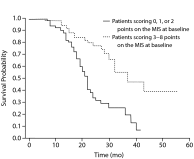The predictive value of the memory impairment screen in patients with subjective memory complaints: a prospective study
- PMID: 23724354
- PMCID: PMC3661332
- DOI: 10.4088/PCC.12m01435
The predictive value of the memory impairment screen in patients with subjective memory complaints: a prospective study
Abstract
Objective: The use of biomarkers in early Alzheimer's disease detection is growing. However, it is not clear whether sophisticated biomarker testing is more efficient than neuropsychological tests focused on memory. The goal of this study was to evaluate the predictive value of the Memory Impairment Screen (MIS), a simple and brief memory test, in elderly subjects with subjective memory loss.
Method: A prospective cohort of 105 patients with subjective memory loss was followed up from December 2007 to April 2011 in Zaragoza, Spain. At baseline, the patients underwent neuropsychological examination with Mini-Examen-Cognoscivo (Spanish adaptation of the Mini-Mental State Examination), MIS, Clinical Dementia Rating scale, Blessed Dementia Rating Scale, and Geriatric Depression Scale. The final endpoint of the study was the conversion to dementia, mostly of probable Alzheimer's disease type according to the National Institute of Neurological and Communicative Disorders and Stroke and the Alzheimer's Disease and Related Disorders Association work group criteria. The patients were reevaluated every 6 months.
Results: After a mean follow-up of 2 years (range, 1-4 years), 57 patients developed Alzheimer's disease and 48 did not. A baseline score of 0 or 1 on the MIS predicted conversion to Alzheimer's disease, with a sensitivity of 42.9%, a specificity of 98%, and a positive predictive value of 96%. The area under the curve was 0.76 (95% CI, 0.66-0.83).
Conclusions: In the clinical setting in patients referred for memory complaints, the MIS score at baseline (0 and 1) is useful to predict who may develop Alzheimer's disease within at least a year. The MIS would be more useful when combined with a higher sensitivity test.
Figures
References
-
- López OL, Jagust WJ, DeKosky ST, et al. Prevalence and classification of mild cognitive impairment in the Cardiovascular Health Study Cognition Study, pt 1. Arch Neurol. 2003;60(10):1385–1389. - PubMed
-
- Petersen RC, Smith GE, Waring SC, et al. Mild cognitive impairment: clinical characterization and outcome. Arch Neurol. 1999;56(3):303–308. - PubMed
-
- Modrego PJ. Predictors of conversion to dementia of probable Alzheimer type in patients with mild cognitive impairment. Curr Alzheimer Res. 2006;3(2):161–170. - PubMed
-
- Kluger A, Ferris SH, Golomb J, et al. Neuropsychological prediction of decline to dementia in nondemented elderly. J Geriatr Psychiatry Neurol. 1999;12(4):168–179. - PubMed
LinkOut - more resources
Full Text Sources
Other Literature Sources
Miscellaneous


